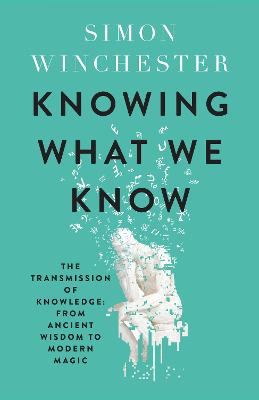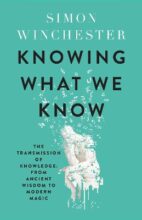
Knowing What We Know
Simon Winchester
£25.00
Description
‘A delightful compendium of the kind of facts you immediately want to share with anyone you encounter’ New York Times
‘An ebullient, irrepressible spirit invests this book. It is erudite and sprightly’Sunday Times
From the creation of the first encyclopedia to Wikipedia, from ancient museums to modern kindergarten classes-here is award-winning writer Simon Winchester’s brilliant and all-encompassing look at how humans acquire, retain, and pass on information and data, and how technology continues to change our lives and our minds.
With the advent of the internet, any topic we want to know about is instantly available with the touch of a smartphone button. With so much knowledge at our fingertips, what is there left for our brains to do? At a time when we seem to be stripping all value from the idea of knowing things – no need for maths, no need for map reading, no need for memorisation – are we risking our ability to think? As we empty our minds, will we one day be incapable of thoughtfulness?
Addressing these questions, Simon Winchester explores how humans have attained, stored and disseminated knowledge. Examining such disciplines as education, journalism, encyclopedia creation, museum curation, photography and broadcasting, he looks at a whole range of knowledge diffusion – from the cuneiform writings of Babylon to the machine-made genius of artificial intelligence, by way of Gutenberg, Google and Wikipedia to the huge Victorian assemblage of the Mundaneum, the collection of everything ever known, currently stored in a damp basement in northern Belgium.
Studded with strange and fascinating details, Knowing What We Know is a deep dive into learning and the human mind. Throughout this fascinating tour, Winchester forces us to ponder what rational humans are becoming. What good is all this knowledge if it leads to lack of thought? What is information without wisdom? Does Rene Descartes’ ‘Cogito, ergo sum’-‘I think, therefore I am’, the foundation for human knowledge widely accepted since the Enlightenment-still hold?
And what will the world be like if no one in it is wise?
Publisher Review
PRAISE FOR SIMON WINCHESTER'S 2021 BOOK LAND 'The intricate vocabulary used to talk about land is one of the many pleasures ... The theme could not be more topical ... It packs in a wealth of ideas and human drama - and gives a fresh view of centuries of social conflict seen through a geographer's lens' Financial Times 'Spend some time with Simon Winchester, and you will sail oceans, survive earthquakes, peer into volcanoes, pore over maps, mine the origins of language and measure the immeasurable world ... Poignant ... Winchester is good ... adding dashes of drama, narrative, indignation and, above all, connection to disparate historical accounts ... There is soul in this book ... A stirring call for communal imperatives, even if its history recounts the constant allure of private ownership' Washington Post 'Moving across varied histories and geographies, he offers us one case study after another of how the once seemingly inexhaustible surface of the Earth has devolved into a commodity ... Winchester is a master at capturing the Old World wonder and romance ... His prose frequently exudes the comfort and charm of a beloved encyclopaedia come to life, centuries and continents abutting through the pages' New Yorker 'Few authors of narrative nonfiction have ranged across the global landscape more widely ... [A] unique blend of wide-eyed curiosity, meticulous research, and erudite analysis ... Of course, this being Winchester, 'Land' abounds with dozens of eye-opening factoids to please any fan of popular history ... But this is no mere bathroom book packed with intriguing facts. His storytelling talents on full display' Boston Globe
Find this book on the following lists
-
Non-Fiction Highlights: History of Ideas
Browse The List
Book experts at your service
What are you looking for?
